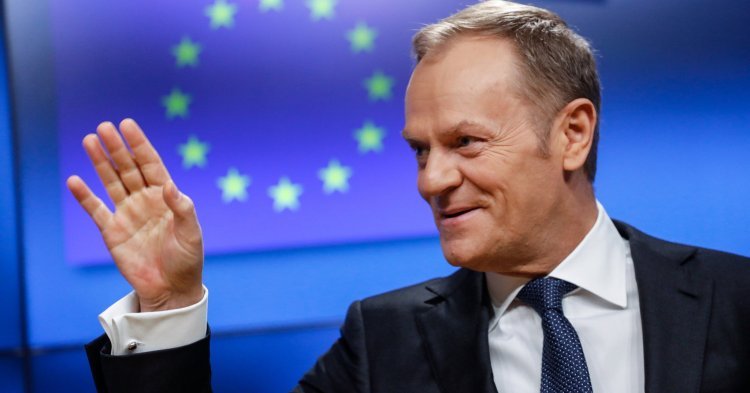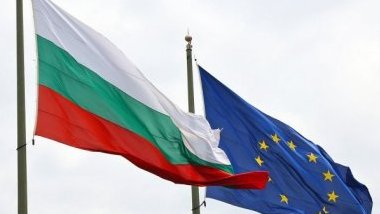Speeches were held by the President of Romania, the president of the Senate, the Vice-chairman of the Chamber of Deputies, President of the European Parliament, the President of the European Council Donald Tusk, the President of the European Commission and the Prime Minister of Romania. One glaring absentee was Liviu Dragnea, the President of the Chamber of Deputies and the president of the ruling party PSD. By the end of the night, it was clear that the golden moment of the ceremony had been Donald Tusk’s speech.
A speech for a European Romania
Tusk did not even have the chance to finish his first sentence before the hall exploded with applause, for the simple reason that he was holding the speech in Romanian. While Tusk has read most of it, the effort of holding a speech at such a prestigious event, in a language you do not speak fluently, did not go unappreciated, neither by the attendees nor by the vast majority of the Romanian citizens.
In a mix of respect, optimism, humor, and intellectuality, Tusk put his trust in the Romanian people, and reassured them of his support and confidence. However, the way he did it was unique to say at least. Between the messages of cooperation, Tusk mentioned Romanian idioms, shared a stanza written by the poet Nichita Stănescu, referenced and quoted intellectuals such as Eliade, Cioran, Ionescu, and Pleșu, and mentioned sportswomen such as Nadia Comăneci and Simona Halep. He even humorously mentioned that the first car in his family was a Dacia 1300, a Romanian car.
Tusk ended the speech by calling all Romanians to defend the fundamentals of our civilisation such as liberty, integrity, the respect for truth, the rule of law and the constitution − the same way as Helmuth Duckadam defended the goal from four penalties in the match against Barcelona, one of the most significant moments in the history of Romanian football.
The mass media has been buzzing since the beginning of his speech, and if social media is anything to judge by, his message reached the people. However, what is most significant in this aspect is not that the people who are familiar with European affairs heard him. What truly matters is that his words reached the people for whom the name Tusk meant nothing until yesterday and the Council of the EU was just a vague term they did not understand.
Cracking the Eurosceptic narrative
Romania might not have an Orbán or a Salvini, yet the Eurosceptic discourse is now more present than ever. ‘Colony of the EU’, Soros, ‘evil NGOs and international companies’, and ‘the decadent West’ are terms often used in the public debate by a crowd of people who push for the idea that Romania is the victim of an evil conspiracy that international institutions have created in order to steal the riches of the country − that everything wrong happening is because of the “Great Powers” and that Romanians are seen only as cheap labor, slaves or second-rank citizens of Europe.
Given the low level of knowledge about the EU, among other factors, the average citizen falls, at least to some degree, into the pit of Euroscepticism. Yet, with one well-placed hit, accidental or not, Tusk might have just cracked the Romanian Eurosceptic narrative. One of the leaders of the ’evil’ EU just showed the ’second rate citizens of the colony’ that he is willing to make an extra effort for his message to resonate with them, that he puts his trust in them, respects them and acknowledges the intellectual and cultural figures of Romania, who are often forgotten even among the national politicians.
It will not make the Eurosceptic discourse disappear overnight. However, the next time when certain figures in the public debate preach about EU’s hate for Romanians, people might just remember that one European leader, who told them in their native language, that he puts all his trust in them and that they are capable of leading Europe.
The elephants in the room
While Tusk’s speech was a highlight, one cannot notice the occasion has some shadowing aspects. In the highest lodge of the Atheneum, next to the leaders of Romania and the EU, were some rather questionable figures. Among them, there was Adrian Severin, who has been condemned by the supreme cour, for accepting bribes during his mandate as an MEP.
And to the left of President Juncker, there was Daniel, the Patriarch of the Romanian Orthodox Church and one of the key people in the anti-LGBT referendum which took place in Romania in October. A referendum which went not only against European values, but also against one of the priorities of the Romanian presidency, namely “promoting the efficient countering of racism, intolerance, xenophobia, populism, antisemitism and discouraging hate speech”.
While hundreds of Romanians were outside the Atheneum, protesting against corruption, the corrupted were inside, applauding speeches about European values such as the rule of law in a show of hypocrisy and irony.
However, as President Donald Tusk mentioned in his speech: “It depends only on you if Romanian politics will be a good example or a harsh warning for Europe.” And as Romanians have done since 2017, they will keep protesting for Europe, for the rule of law and against corruption.






Follow the comments: |
|
